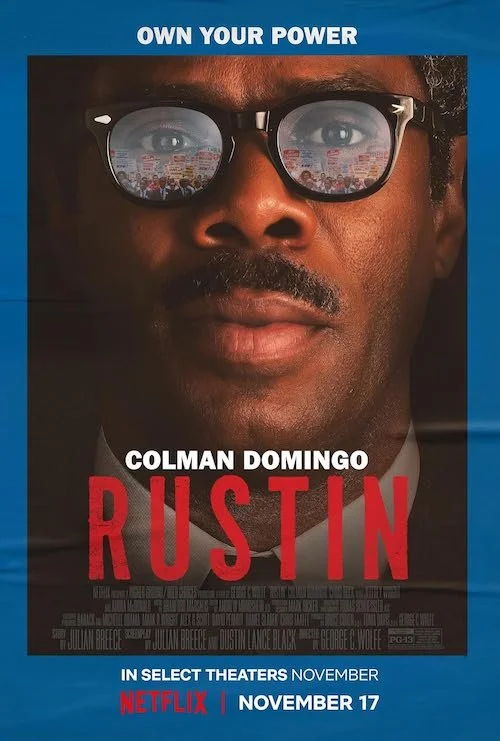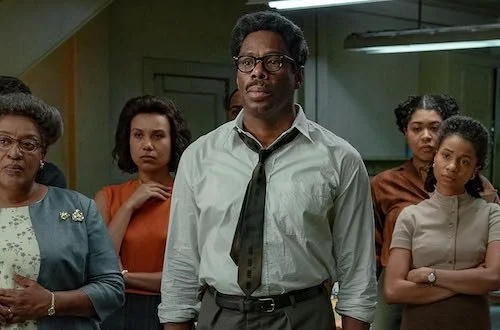Rustin
Written by Andreas Babiolakis
One of the first sequences in George C. Wolfe’s latest film, the biographical drama Rustin, is an appropriate symbol of how the entire film will play out. In a scene where we get introduced to activist Bayard Rustin, he is hidden in the shadows and the scene feels like it prioritizes other characters above him. It doesn’t even feel like it’s going to be a film about Rustin despite this being how we get acquainted with him. Just like that, Colman Domingo — who plays Rustin via his best performance to date — pops out of the darkness, comes into the light of the scene and steals the focal point entirely. Was this always meant to be Rustin’s scene? Yes, but it is so awkwardly staged that it doesn’t instantly read that way. Domingo makes it happen. This scene sets the precedent throughout Rustin, as Wolfe makes a film that kind of just exists within biopic tropes while Domingo elevates the picture into something watchable and memorable. If we had another actor at the forefront, I don’t know if this film would operate outside of the barest notion that this is indeed a motion picture. Domingo truly is remarkable and must be seen in a film that serves as his backdrop.
The film explores Rustin’s pivotal role in the 1963 March on Washington, alongside his personal life as both a Black and gay man. The film glosses over so much in its brisk, one-hundred-minute runtime, and it shows: Rustin feels like we’re skimming over a Wikipedia page when we should really be scrutinizing every step of the triumphs of a man whose legacy has been hidden for generations. This is the opportunity to educate us on Rustin and what he stood for inside and out. We get some strong speeches and monologues (which, of course, Domingo soars with), and not much else. We zip through this orchestration from top to bottom. The film is over in a flash with some follow-up anecdotes that hold the same weight as most of the scenes we’ve just seen. It’s quite unfortunate, given the importance of this film and its central figure; that the film kicks off as though we are leaping into the middle of a film that was already ongoing and ends just as soon as we make some emotional and narrative headway is not really satisfying or sensical.
Colman Domingo is unstoppable as Bayard Rustin in a film that lags behind his tremendous performance.
Even so, Domingo shines with his committed, breathtaking performance as Rustin. Even alongside some of the strongest actors of the year that also appear in Rusitn (Jeffrey Wright in American Fiction, Da’Vine Joy Randolph in The Holdovers), Domingo is a powerhouse that is equal parts classically trained and a full-on, borderline method transformation à la a more contemporary approach to acting. While the film meanders, Domingo spearheads every scene, every line, every breath. To truly learn the impact of Bayard Rustin, maybe check in with some other resources. To feel his presence — or just to catch one of the year’s top performances — Rustin suddenly becomes a must-see film. In fact, Domingo is so strong that Rustin goes from so-so to a necessary watch. You may not retain much afterward outside of this one pressing thought: “Wow. I hope Colman Domingo finally gets his flowers.”
Andreas Babiolakis has a Masters degree in Film and Photography Preservation and Collections Management from Ryerson University, as well as a Bachelors degree in Cinema Studies from York University. His favourite times of year are the Criterion Collection flash sales and the annual Toronto International Film Festival.






